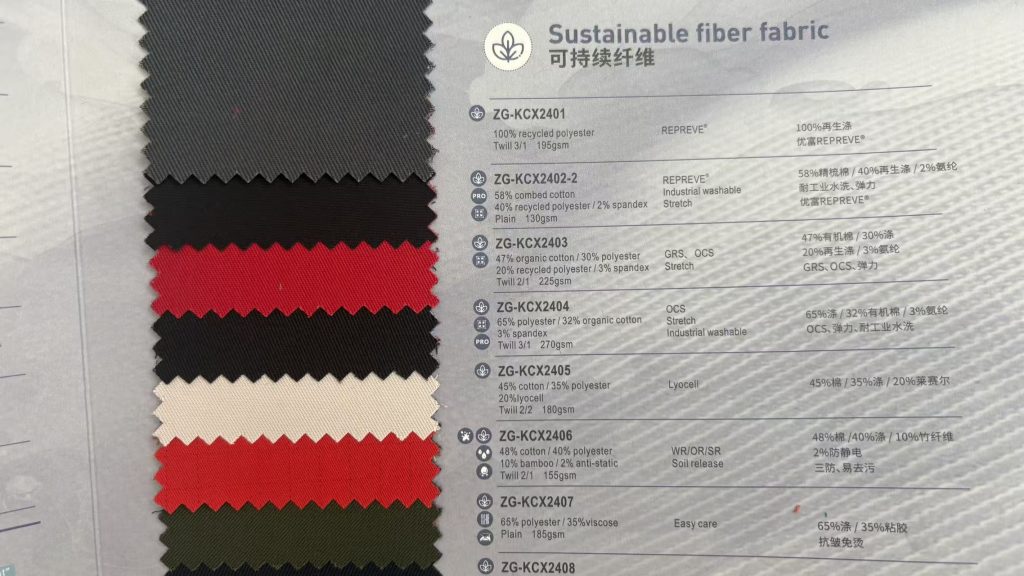Our company has been supplying recycled fabrics for several years, working with international brands and fabric buyers. From this experience, we’ve learned that sourcing recycled fabric is not only about choosing a sustainable option—it also involves certifications, supply chain traceability, and clear technical specifications. Here are the key points you may interested.
When buying recycled fabric, the most important considerations are: material type (such as recycled polyester, recycled nylon, or organic cotton), certifications (GRS, OCS, etc. to ensure supply chain traceability), and detailed fabric specifications. These steps help ensure that your order is sustainable, compliant, and reliable.
Let’s take a closer look at each of these factors and why they matter in practice.
What types of sustainable fabrics are available?
The most widely used sustainable fabrics include recycled polyester, recycled nylon, and organic cotton.
- Recycled polyester (rPET) is produced from post-consumer waste like plastic bottles.
- Recycled nylon often comes from discarded fishing nets or industrial waste.
- Organic cotton is grown without pesticides and synthetic fertilizers.
These fabrics help reduce waste and environmental impact while maintaining durability and quality. In practice, many buyers simply upgrade an existing fabric specification into a recycled version, which makes the transition smoother with little impact on look or feel.
What certifications should buyers and suppliers have?
Certifications are essential in the recycled fabric supply chain. The two most common are:
- Global Recycled Standard (GRS)
- Organic Content Standard (OCS)
Both certificates are valid for one year and involve significant costs. Importantly, certifications are required on both the supplier and buyer side. Without this, a supplier cannot issue a Transaction Certificate (TC).
The TC is an important document that details fiber composition, weight, and delivery time. More importantly, it ensures traceability across the supply chain. Based on our experience, brands that consistently request TCs can demonstrate compliance more effectively and avoid risks of greenwashing.
Learn more about our GRS certified fabrics
Why is supply chain traceability so important?
Sustainability is not only about the fabric itself—it is also about proving where it comes from and how it is processed. For buyers, supply chain traceability builds trust with end consumers and meets the increasing compliance requirements in Western markets.
This is why every recycled fabric order should come with a transaction certificate fabric [link to traceability page]. It ensures that the fabric’s journey from raw material to finished roll meets certified standards.
How do you define your recycled fabric requirements?
Another key step is to define your needs clearly before placing an order. Buyers should confirm:
- Fiber composition
- Fabric weight (GSM)
- Yarn density and yarn count
Most recycled fabrics are made-to-order. For example, if you want to switch an existing polyester fabric to recycled polyester, you only need to share the specifications. The supplier will then handle raw material sourcing, weaving, dyeing, and finishing.
We frequently support recycled polyester fabric buyers https://ripstopfabric.com/product/recycled-polyester-organic-cotton-stretch-fabric-for-trousers/ and recycled nylon fabric wholesale, helping them upgrade existing products into sustainable alternatives without major disruption.
What are the pros and cons of recycled polyester fabric?
Pros
- Environmental benefits: significantly reduces waste and energy use compared to virgin polyester.
- Comparable quality: in terms of color, hand feel, and performance, recycled polyester is very similar to conventional options.
- Proven adoption: many eco-friendly fabric brands [link to case studies] already use recycled polyester at scale.
Cons
- Bleaching limits: recycled polyester may not reach very high whiteness for bleached fabrics.
- Higher cost: certification and processing make it more expensive than virgin polyester.
- Larger MOQ: suppliers usually need higher minimum orders to secure recycled raw materials before production.
Which global brands are already using eco-friendly fabric?
Several well-known workwear brands in Europe and the U.S. have already integrated recycled fabrics into their product lines:
-
🇪🇺 TenCate Protective Fabrics – Tecawork® Ecogreen® (Netherlands/Belgium)
Their Tecawork® Ecogreen® EG 317 combines recycled polyester and organic cotton, providing durable and sustainable options for industrial workwear. -
🇪🇺 DASSY® Workwear (Belgium)
DASSY® Workwear includes collections that integrate recycled fibers, combining functionality with sustainability for professional users. -
🇺🇸 Dovetail Workwear (USA)
Their Built to Last Collection uses recycled polyester and other sustainable fibers, focusing on durable workwear designed for women.
These examples show that recycled fabrics are no longer niche—they are becoming a standard choice across the global market.
Recycled fabrics offer a practical way for brands to reduce their environmental impact while maintaining quality. From our years of supplying recycled fabrics, we have seen that success depends on preparation: choosing the right material, ensuring certifications are in place, and defining fabric specifications clearly.
If you’re looking for experienced sustainable fabric suppliers [link to contact page], our team is here to provide guidance and deliver recycled fabric solutions tailored to your brand’s needs.

